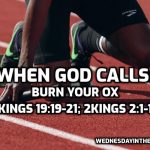What if God has called me to something and I’m just plain afraid to follow? What if the path He has put before me seems too frightening or overwhelming?
Kings
02 When God calls: Rethink greatness
How do you accomplish great things for the kingdom of God and quiet that inner voice that says whatever you’re doing, it’s not enough? In 2Kings 5 we see a series of contrasts between how the world measures greatness and God measures greatness.
01 When God calls: Burn your ox
When God called Elisha to be succeed the prophet Elijah, Elisha was a farmer with no apparent qualifications. Yet Elisha burned his ox and followed. Then Elisha refused to leave his mentor’s side, humbly asking that God equip him for the journey ahead.
Miracles of Elijah & Elisha
A comparison of the miracles of Elijah and Elisha recorded in 1&2 Kings.




